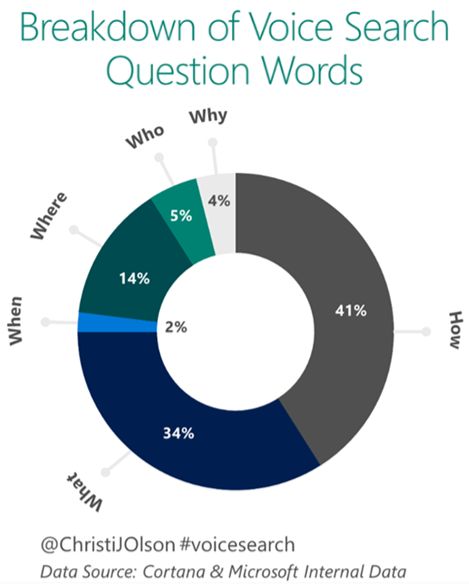Voice search is the next big frontier in consumer behavior, business visibility, and technological evolution. Voice-based technology, based on the simple premise of asking questions out loud, is poised to create a major disruption in the digital industry.
But it's not just the future that will evolve.
Voice search is changing the landscape of consumer search right now. Homeowners are shouting to Siri about the location of the nearest Home Depot while manically mopping up after a burst pipe. Driver's stuck in traffic are asking Alexa for prices on the nearest relaxing beach vacation. Cortana stands ready to pull up both your dinner recipe and your favorite radio station while coordinating that expected cook time before the next work deadline.
Voice assistance is already everywhere, and this technology is set to only expand from here on out.
1. Why should my business care about voice search?
Your business should care about voice search because that is how your customers will find you. Voice control is becoming a key interface with smart home technology—and it's being integrated into smart home technology by Microsoft, Google, Samsung, and Apple to keep up with the trend begun by the Amazon Echo in 2014.
The future of search is about being both prevalent and personal. There will be an estimated 25 billion internet-connected devices by 2020, and users will expect a seamless experience as they move from device to device. And they will expect the same level of accuracy both for spoken and for typed inquiries.
Today, none of the digital assistants (Siri, Cortana, Google Assistant, and Alexa) has paid spoken advertisements, but the day will come. Consumers will expect any ads that appear or are spoken in response to their search to be directly relevant—i.e., understand the context behind the search—and will easily get frustrated with content that doesn't match their interests and preferences.
2. But don't people just use voice to search for music and weather?
A full 50% of all searches are expected to be voice- or image-based by 2020. And barriers to using the technology are dropping.
What was frequently a method of finding information at home or when alone is now a common way for people to search in public. Even though many people agree that listening to other people give voice commands can be annoying (45%), most people find it faster (60%) and say it makes their smartphone use easier (66%), according to a study by Stone Temple. Almost 20% of respondents have even used voice search in a theater, the same study found.
Voice searchers are trying to answer various types of questions, according to analysis from Microsoft/Bing. "How to" questions top the list, but voice searchers are also looking for straightforward information, beginning many queries with "What" and "Where":

So, if your customers are increasingly using voice search—and using it for widespread search behavior—what will happen if you remain inaccessible to these queries?
You don't want to risk being left behind. You'll need to position your business to be the answer to the questions detailing how to use your product, what problems your services solve, how to find you, and why your company matters.
3. Where do the spoken answers come from digital assistants (Cortana, Alexa, Google Assistants and Siri) come from?
Digital assistants derive their spoken answers from various sources, based mainly on the type of the question being asked.
If you ask the digital assistant to tell you joke or to chit-chat through phases such as "I love you," the spoken response comes from responses by the teams of developers who have created the personality of each digital assistant. The personality is injected with human responses—and, when using a sense of humor, via input from comedians.
If you ask a digital assistant about your schedule, to remind you of something, or to access an app on your device, it pulls the response directly from the data and apps that you've allowed it to access.
For almost all other types of questions you might ask a digital assistant, it searches the Web for a response using search engines, such as Bing and Google, which are the intelligence platform powering digital assistants:
- When someone asks a question the answer to which is fact-based—such as "What is the capital of the United States?"; "Do I need an umbrella today"; "How many inches are in a centimeter?"; and "What's the currency conversion rate between Australian Dollars and American Dollars?"—the response is pulled from the search engine's knowledge graph (i.e., a series of trusted sources identified by the search engine).
- For other questions—such as "Where is the nearest Mod Pizza?"; "How do I get red wine out of carpet?"; "What is the best vehicle for two rear facing car seats?"; "What are the top things to do in St Louis?"; and "How much does an inflatable bouncy house rental cost?"—the search engines pull the spoken responses from what's known as featured snippets/instant answers or position zero from organic search results.
Over half of these spoken responses come from featured snippets, and this is where the opportunity lies for businesses.
4. What things should I remember to rank my business in voice search results?
Understanding the importance of voice search is just the beginning. Now you need to know how to capitalize on it. Here are five best-practices and common questions along with their answers:
A. Embrace schema and structured data mark-up on your website
The search engines use structured data and schema mark-up to help gain more context about a website, its products, and its services. Use structured data or schema in HTML to help ensure that the search engines have correctly categorized and understood your website.
B. Learn to love the local
Many of the current studies on voice search show that local search volume is higher than for more general geographic areas. Emphasizing your local presence can help you rank higher in voice search results, along with being a good SEO strategy for both paid and organic standard search, too.
Make sure that you have claimed your business listing in Bing Places, Google My Business, and Apple Maps Connect, and ensure that your business information, such as name, address, phone number, and store hours, are correct and up-to-date.
C. Do I need different search campaigns for Cortana, Alexa, and Siri?
Today, no, because the digital assistants don't have direct advertising opportunities to be the spoken or sponsored response.
There are, however, differences in how each digital assistant performs and which search engine they use to pull in their spoken answers and search results on devices with a screen. Cortana shows ads from Bing Ads; Alexa can show ads from Amazon, Google AdWords, and Bing Ads; and then Siri and the Google Assistant can show ads from Google AdWords.
Fortunately, those differences should not require massively different strategies. Similar to the way you can import Google AdWords campaigns into Bing Ads, you should be able to customize many of the same strategies to capture audiences using different devices.
D. Will my paid ad influence my results in voice search?
No, paid ads do not have an impact on the spoken response in voice search. The spoken response comes predominately from the search engine's knowledge graph or from an instant answer/featured snippet.
There are currently no advertising opportunities within the digital assistants, but the technology is rapidly evolving and that could change with little notice.
E. How do I focus my keywords for voice search?
Voice search tends to be a direct reflection of how we speak. Though you might type "dog" into a search bar and happily scroll through images, you wouldn't do that with voice. Users will create long-tail keywords by askoing questions instead: for example, "Find rescue beagle-mix rescue dog Seattle."
Use sources like AnswerThePublic.com to visualize the types of questions people are asking search engines about a specific keyword or phrase.
* * *
It's time to embrace voice search for your business. It's true that voice technology is still evolving, but it's not true that you have time to wait. Voice search is happening now and it's only going to get bigger.
Start positioning your business to rank in search results before you get left behind.




